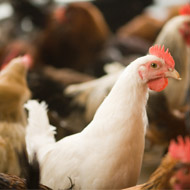
Birds must be housed indoors until 16 March
Northern Ireland has extended its avian influenza prevention zone until 11.59 on 16 March 2017, in light of the continuing risk of outbreaks.
The prevention zone, which is similar to requirements in England, Scotland and Wales, requires all captive birds to be housed indoors or separated from wild birds.
Outbreaks of avian influenza H5N8 have been confirmed on two turkey farms in Lincolnshire, backyard flocks in North Yorkshire and Carmarthenshire, and numerous wild birds across Great Britain.
There have not yet been any cases of H5N8 in Northern Ireland, but chief veterinary officer Robert Huey said “we should not be complacent given the ongoing disease situation elsewhere.”
He warned that failure to comply with the prevention zone could have “very serious implications” for the keepers themselves, and neighbours who keep poultry.
“Should there be an outbreak in any poultry flock, including a backyard flock, not only will the birds die from the disease or be culled to reduce the risk of spread, but it will also be necessary to set up a 10km control zone around the infected premises, which will seriously impact on movement of poultry in the zone for some time and will also have a serious impact on our ability to export poultry products.
“Failure to comply with the housing requirement is also an offence and could lead to prosecution.”
Poultry keepers are urged to be vigilant and make any necessary improvements to their biosecurity.
“Even when birds are housed there is still a risk of infection and biosecurity should not be compromised,” Mr Huey added. “Clothing and equipment should be disinfected, the movement of poultry should be reduced and contact between poultry and wild birds should be minimised.”
There continues to be a ban on gatherings of some species of birds, for example livestock fairs, auctions, shows and other events. It covers bird species that are considered to be at greater risk of spreading avian influenza, including all poultry and game birds, ducks, geese and swans.



 The BSAVA has opened submissions for the BSAVA Clinical Research Abstracts 2026.
The BSAVA has opened submissions for the BSAVA Clinical Research Abstracts 2026.